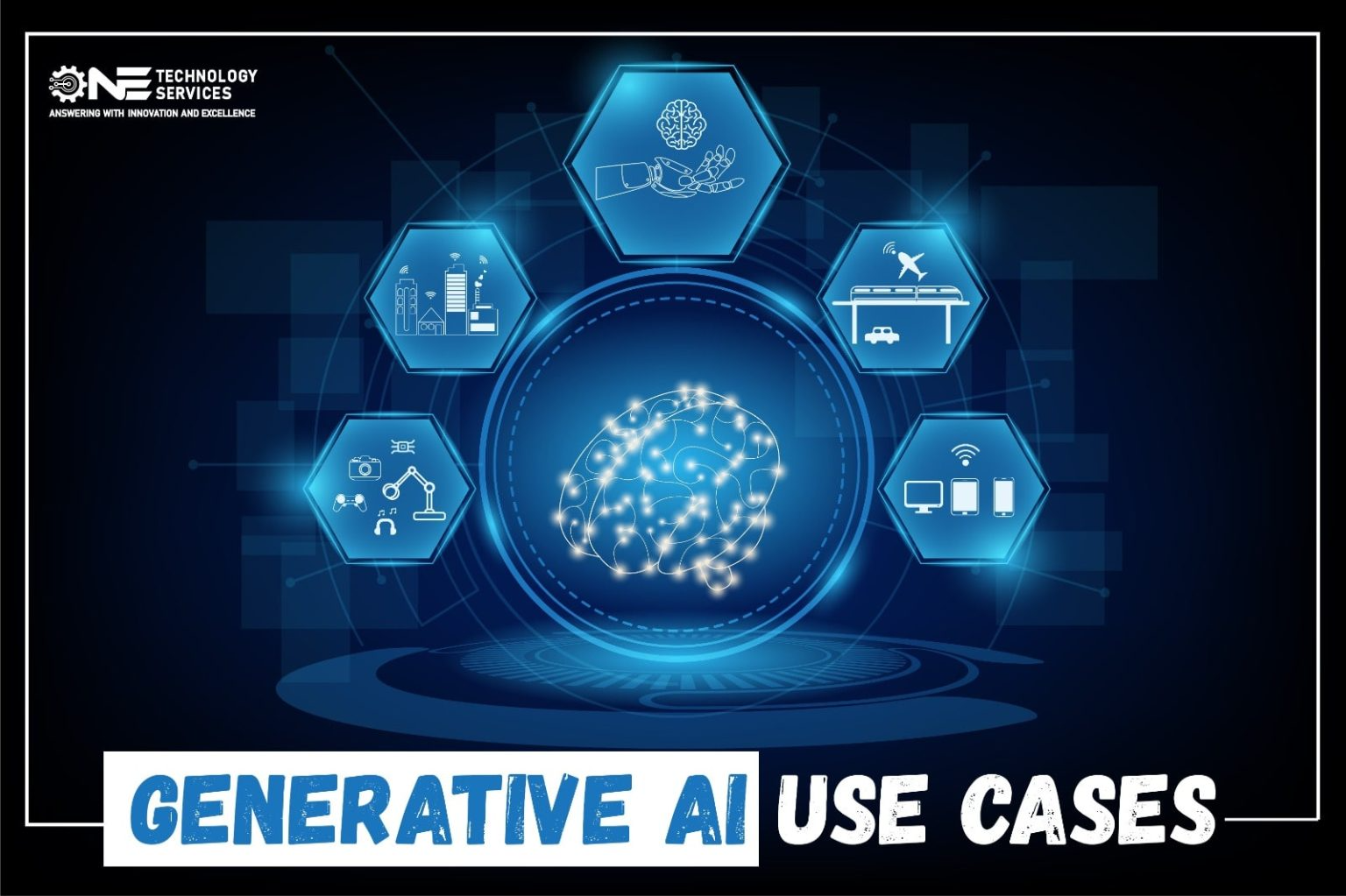Generative AI has rapidly emerged as one of the most transformative technologies of the 21st century, revolutionizing industries by automating tasks, enhancing creativity, and delivering personalized solutions. From generating text and creating realistic images to coding assistance and medical research, generative AI is making a profound impact across diverse fields.
This blog explores the remarkable use cases of generative AI, highlighting how businesses and individuals can harness its potential. At One Technology Services, we aim to provide insights that empower businesses to embrace this innovative technology effectively.
What is Generative AI?
Generative AI refers to artificial intelligence systems designed to create new content, such as text, images, videos, and even music, based on the data they are trained on. Unlike traditional AI, which primarily processes and analyzes data, generative AI takes it a step further by producing original and creative outputs.
Some well-known examples of generative AI models include OpenAI’s GPT, DALL-E, and Stable Diffusion, which are used for tasks like text generation, image creation, and much more.
Why Generative AI is Transformative
The ability of generative AI to create high-quality, human-like outputs at scale has made it an invaluable tool for businesses and individuals alike. From streamlining workflows to enabling innovation, its applications span multiple industries, transforming how we work, create, and solve problems.
Stat: By 2030, generative AI is projected to contribute over $4.4 trillion annually to the global economy (Source: McKinsey).
Remarkable Use Cases of Generative AI
1. Content Creation and Marketing
One of the most popular applications of generative AI is in content creation. Businesses can leverage AI to generate articles, blogs, social media posts, and product descriptions. AI tools streamline workflows, enhance creativity, and ensure consistency in messaging.
Examples:
- Generating SEO-optimized blog posts in minutes.
- Creating personalized email campaigns tailored to individual customers.
- Producing captivating ad copy for digital marketing.
How it helps: Generative AI enables marketing teams to save time, reduce costs, and scale content production.
Stat: Companies using generative AI for content creation see a 30% increase in productivity.
2. Software Development and Coding Assistance
Generative AI tools have become indispensable for developers by automating repetitive coding tasks and offering suggestions for faster development.
Applications:
- Writing boilerplate code or scripts.
- Debugging and troubleshooting errors.
- Generating documentation for APIs and software libraries.
Popular tools: GitHub Copilot and Tabnine are examples of AI systems that help developers code more efficiently.
Stat: Developers using AI tools report a 55% reduction in time spent on repetitive tasks.

3. Creative Design and Visual Arts
Generative AI has unlocked new possibilities in design and art by enabling the creation of stunning visuals, animations, and branding materials.
Applications:
- Designing custom logos, banners, and website elements.
- Generating photorealistic images for e-commerce or marketing.
- Creating AI-powered illustrations for creative projects.
Example: AI tools like DALL-E and MidJourney allow artists and designers to experiment with unique styles and concepts.
Stat: The demand for generative AI tools in design is expected to grow by 40% annually.
4. Healthcare and Drug Discovery
Generative AI is revolutionizing the healthcare industry by aiding in research, diagnostics, and patient care.
Applications:
- Developing new drugs by simulating molecular interactions.
- Enhancing medical imaging for faster and more accurate diagnoses.
- Creating personalized treatment plans based on patient data.
Example: AI models are helping researchers identify potential drug candidates at unprecedented speeds.
Stat: Generative AI reduces the time for drug discovery by up to 50%, accelerating the path to clinical trials.
5. Virtual Assistants and Customer Support
Generative AI is improving customer experiences by powering virtual assistants and chatbots that handle inquiries and provide personalized solutions.
Applications:
- Automating responses to frequently asked questions.
- Personalizing product recommendations.
- Providing multilingual support to cater to a global audience.
Example: Virtual assistants like ChatGPT are widely used for customer service in industries like e-commerce and banking.
Stat: Companies that use AI-powered virtual assistants see a 25% reduction in customer service costs.
6. Education and E-Learning
In education, generative AI is transforming how students learn and educators teach.
Applications:
- Creating personalized learning materials and lesson plans.
- Automating the grading of assignments and assessments.
- Generating interactive quizzes and tutorials.
Example: AI-driven platforms can adapt content to the learning pace and style of individual students.
Stat: E-learning platforms using generative AI see a 40% increase in student engagement.
7. Financial Services
Generative AI is streamlining operations in the financial sector, enabling faster decision-making and better risk management.
Applications:
- Automating the creation of financial reports and forecasts.
- Detecting fraudulent activities through pattern recognition.
- Generating investment strategies tailored to client goals.
Stat: Banks using AI-powered tools reduce the time spent on financial forecasting by 35%.
8. Gaming and Entertainment
Generative AI has made significant strides in the gaming and entertainment industries, enhancing user experiences and content creation.
Applications:
- Designing realistic gaming environments and characters.
- Automating the creation of storylines and dialogue for video games.
- Generating music and sound effects for movies and games.
Stat: The gaming industry is expected to invest over $2 billion in generative AI by 2025.
Ethical Considerations in Generative AI
While generative AI has many benefits, it also raises ethical concerns, such as the misuse of generated content and biases in AI outputs. Addressing these challenges requires responsible AI usage and robust regulations.
Tips for ethical use:
- Regularly audit AI systems to minimize biases.
- Ensure transparency in how AI is used.
- Educate teams about the ethical implications of generative AI.
The Role of One Technology Services
At One Technology Services, we recognize the transformative potential of generative AI and are dedicated to helping businesses harness its power responsibly. From implementing AI-driven content creation tools to developing AI-powered customer support systems, we provide tailored solutions that align with your goals.
Whether you’re exploring the use of generative AI in marketing, healthcare, or software development, our expertise ensures that your organization remains ahead of the curve in this rapidly changing technological landscape.
Final Thoughts
Generative AI is reshaping industries and revolutionizing the way we work, create, and innovate. From content creation and software development to healthcare and gaming, the use cases of generative AI are vast and impactful.
By understanding these applications and adopting the technology responsibly, businesses and individuals can unlock new levels of efficiency, creativity, and growth. At One Technology Services, we are here to guide you in leveraging generative AI to achieve your goals and drive meaningful change.
Let’s explore the possibilities together and shape a smarter, AI-driven future
Read More:
How to Plan for Maintenance and Updates in Custom Software Development
Maximizing Your Email Marketing ROI: 8 Strategies for Better Returns
Google Gemini Pro vs OpenAI ChatGPT-4: A Comprehensive Comparison

